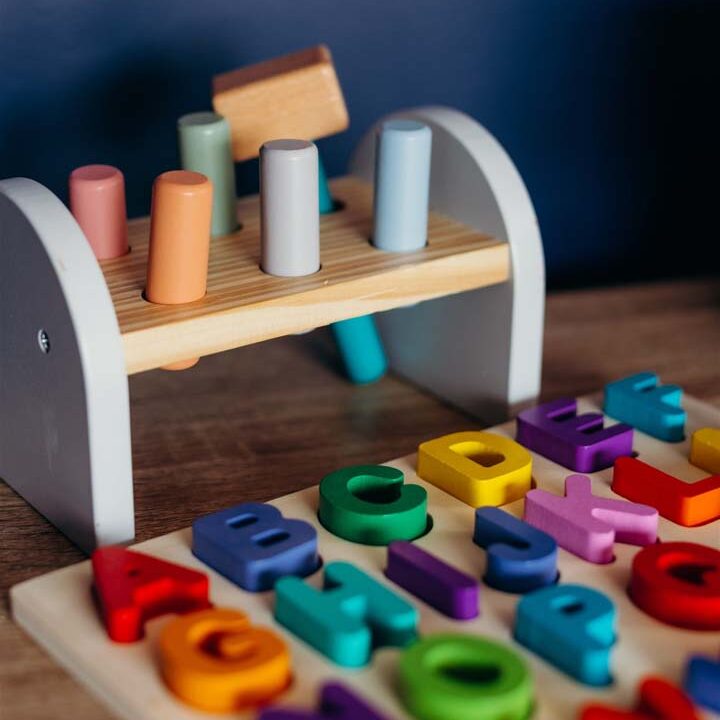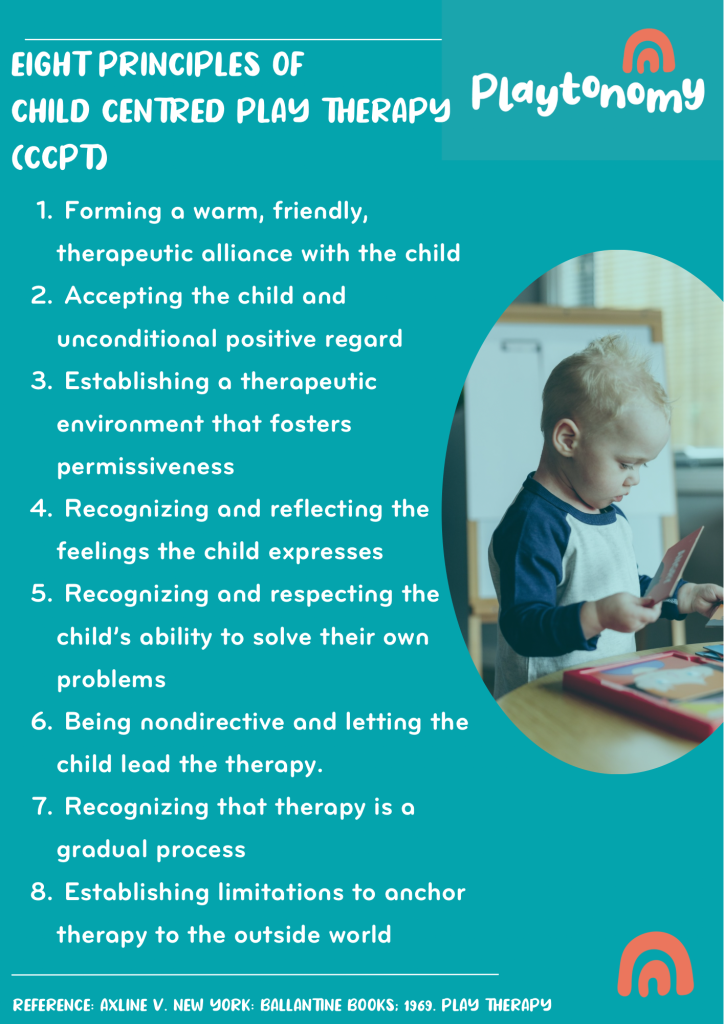
Child Centred Play Therapy (CCPT) is a therapeutic approach designed for children primarily 3-12 years of age. CCPT allows children to process their feelings at their own pace, with the therapist providing a trauma-informed space and supportive responses. This is achieved using the eight principles that underpin CCPT, and this can be very effective for a child's social and emotional development.
This non-directive method is particularly effective for children who have experienced adverse childhood experiences (ACES) as children can communicate their conscious and unconscious struggles through play. CCPT is particularly beneficial for pre-verbal or non-speaking children. CCPT allows the child to establish a strong therapeutic alliance without the pressure to express themselves in specific ways.
Sessions can be conducted one-on-one or include siblings or parents. Depending on the therapist availability, these sessions can be completed in-clinic, at school or in a community setting. Travel is applied as an additional fee.
We provide a safe and nurturing space where children can explore their feelings and experiences through play. This approach encourages creativity, helps build confidence, and promotes emotional healing, empowering children to communicate and connect in ways that feel comfortable for them.

Child-Parent Relationship Therapy (CPRT) by Gary Landreth focuses on improving the bond between parents and their children through play therapy techniques. The approach emphasizes the importance of play as a natural form of communication for children. CPRT helps parents learn to engage with their children in a supportive, nurturing way, enhancing emotional connection and improving behavioural issues. The goal is to foster a safe environment where children can express themselves freely, leading to healthier relationships and emotional development.
Before working with your child, we conduct Developmental Assessments for children aged 2-6, using input from the primary parent and, ideally, their educator. These assessments provide a comprehensive view of the child’s developmental abilities and help us plan targeted activities to support their growth.
Our Child Development Sessions focus on school readiness and are tailored for children with developmental delays identified during screening. For younger children, we use a play-based approach, while sessions for school-aged children are more directed by the practitioner and adjusted term-by-term based on feedback from parents and teachers.
To achieve developmental goals, we discuss your child’s interests and learning styles. For nonverbal children, we observe them during sessions to identify their interests. We create a supportive environment with resources aligned with their needs and provide take-home activities to reinforce skills, which is encouraged but not mandatory.
Finally, we can prepare a "Transition to School Statement" for you to share with your child's teacher or keep for your records before they start school.
If a parent requests, we can conduct holistic developmental assessments for children two-to-six years of age; typically re-evaluating every 12-16 weeks based on each child's needs and session frequency.
These assessments focus on identifying any areas the child may need additional support such as: fine and gross motor skills, social and emotional development, speech and language, and cognitive abilities, utilising the Ages and Stages 2 & 3 questionnaires as part of our evaluation process. NOTE: These assessments are not diagnostic and do not provide you with a diagnostic criterion for intervention.
The results provide us some insight into your child’s overall development and help set meaningful goals for their therapeutic or developmental plan.
These assessments are conducted for several key reasons:
We may use other assessments within our service depending on the qualifications of allied health professionals. They may recommend various assessment methods tailored to each child's unique needs. By considering specific areas of concern, we can better support your child's growth and well-being.
Most often when we receive referrals, they are from families or services seeking ongoing therapy or a block of sessions with a therapist for their child. Alternatively, we do have some referrals where a family may be seeking a consultation to discuss their child’s needs, and they are unsure if this will progress to therapy for the child.
Parent Progress Sessions:
Throughout your child's therapy journey with us, we provide regular feedback on their progress. We want to work with the whole family to ensure that they feel informed and a part of the journey with their child, and we can assess the effectiveness of the therapy within the home or school context as well. Within the progress sessions we discuss what themes are coming up for the child in their sessions and any positive changes that we could implement in the home/school context to support the child outside of their therapy sessions.
Consultation Sessions:
For parents seeking additional support or may be seeking advice, we offer guidance and resources tailored to your child. We have therapists in our service who can facilitate one on one or group training programs such as "Bringing Up Great Kids," “Filial Therapy” "Circle of Security," and "Theraplay."
In addition to this, some families may have just one issue or a topic they’d like to discuss with a therapist. These families may book a short-term intervention or ongoing consultation sessions with a therapist without the need for their child to attend therapy.
In these circumstances we can begin by booking in a 30- or 60-minute consultation so the parent can discuss their child’s behaviours of concern or their worries with us and we can make an informed decision on steps forward from there. This holistic approach helps us determine what type of therapy with us or with another service would be most appropriate.
Art therapy provides a powerful avenue for people to express their thoughts, concerns, and life challenges through creative exploration. In our sessions, participants can communicate in ways that may be difficult with words, allowing them to process emotions, build self-esteem, and develop coping skills. We create a safe and nurturing environment where an experienced therapist facilitates co-regulation and emotional support as needed.
Most sessions take place in a play-based setting, which is especially beneficial for younger participants who often connect more readily with expressive arts in their own unique ways. This approach not only fosters creativity but also enhances critical thinking skills and social interactions. Art therapy promotes healing and personal growth while empowering children to navigate their feelings and experiences in a supportive context.
Child counselling provides a safe and nurturing environment for children and their families to explore their thoughts and feelings. Through a humanistic lens, counsellors prioritise each child's unique experiences, fostering self-awareness and personal growth.
Counselling sessions encourage open communication, allowing children to express themselves and address challenges such as anxiety, sadness, or family dynamics. This process offers gentle guidance on understanding emotional needs and building positive relationships within the family.
Using techniques like play therapy and expressive arts, children are empowered to develop coping skills and learn emotional regulation. This collaborative approach strengthens resilience, the child’s sense of self, confidence and self esteem and will allow them to apply coping skills they have practiced in therapy into their everyday life.
Parent counselling offers a safe and supportive space for individuals and families to explore thoughts and feelings. Using a humanistic approach, therapists prioritize each person's unique experiences, fostering self-awareness and personal growth.
Counselling sessions encourage open communication, helping parents address challenges such as anxiety, depression, or family dynamics. The process provides guidance on supporting emotional needs and enhancing family relationships.
Through techniques like talk therapy and other expressive methods, individuals are empowered to develop coping skills and emotional regulation. This collaborative approach strengthens resilience and helps families navigate life's complexities together, promoting overall well-being.